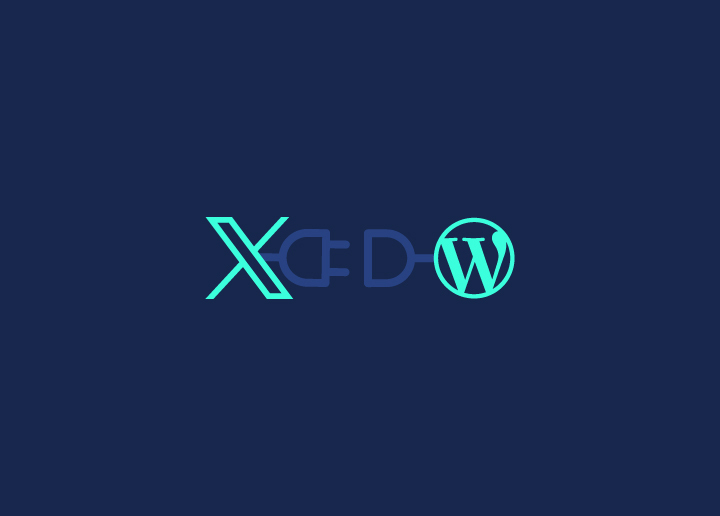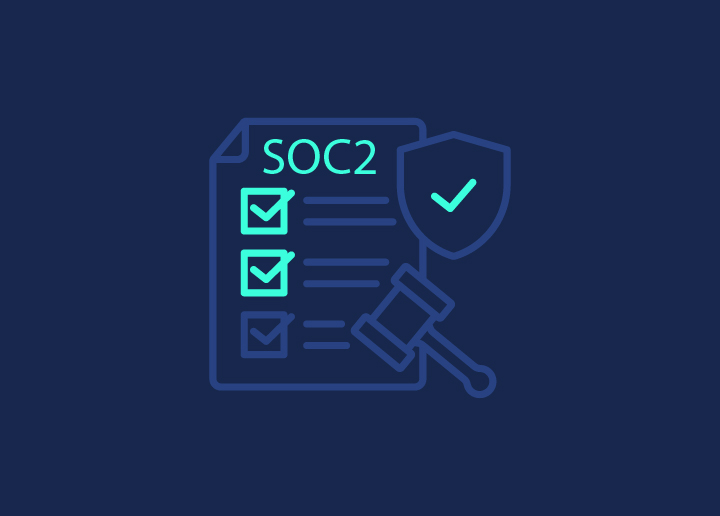White label partnerships have emerged as a strategic way for companies to expand their product offerings and market reach without investing in new product development. This approach involves a symbiotic relationship between two businesses, where one company produces goods or services, and another markets them under its brand name.
White label partnerships are particularly popular in industries like software, consumer products, and digital marketing services, where brand identity and customer loyalty play a significant role in market success. This model offers numerous benefits, including cost efficiency, brand expansion, and access to new markets. However, it also demands careful planning, clear communication, and a strong alignment of goals and values between the partnering companies.
As we delve into the guide to building a successful white label partnership, we’ll explore the key steps and considerations necessary to forge a mutually beneficial and enduring relationship in this innovative business landscape.
Related: What Is A White Label Agency & How Does It Work
Contents
ToggleUnderstanding White Label Partnerships
To embark on a successful white label partnership journey, it’s crucial to grasp the essence of the concept. This collaborative arrangement involves one agency (the white label partner) providing its services or products to another agency, which markets them under its brand. This model enables businesses to expand their offerings, improve efficiency, and enhance their market presence without the need for extensive internal resources.
Read: Top White-Label Services That Agencies Can Resell
What is a White Label Partnership?
A white label partnership is a business arrangement where one company produces a product or service and another company rebrands and sells it as its own. This type of partnership allows the rebranding company to offer new products or services without having to develop them from scratch. The producer, in turn, gains access to new markets and revenue streams through the partner’s established brand and customer base.
Know: What Is A White Label Agency & How Does It Work?
Key Benefits of White Label Partnerships
Cost Efficiency
One of the primary advantages of a white label partnership is cost efficiency. Companies can expand their product or service offerings without the significant investments typically required for development, manufacturing, or hiring additional staff. This approach allows businesses to save on R&D costs and reduce time-to-market for new offerings.
Interesting read: 10 Common Myths on White-Label Agency
Brand Expansion
Leveraging another company’s expertise allows businesses to broaden their market reach and enhance their brand’s credibility. By partnering with a company that has a proven track record and high-quality products or services, a business can quickly expand its portfolio and appeal to a broader audience.
Access to New Markets
White label partnerships provide access to new customer bases through established brands. This is particularly beneficial for companies looking to enter new markets or regions where they may not have a strong presence. The rebranding partner’s existing relationships and market knowledge can help navigate these new landscapes effectively.
Read: Top White-Label SEO Service Providers
Why Focus on White Label Partnerships?

Getting in touch and collaborating with businesses to share resources and promote growth has become increasingly common. It’s a pragmatic approach that allows companies to broaden their market presence without adding any expense. Many successful entrepreneurs have leveraged strategic partnerships to strengthen their brands and expand their businesses.
Picture a scenario where you own a small business and aim to make it international. Sounds dreamy, right? You can achieve this by entering into a collaboration with companies with a foothold in those regions and accelerating your expansion.
The benefit here is mutual: while you gain access to new markets, your partners can hold onto your customer base and revenue streams, creating a win-win situation for both sides.
Partnerships Are Essential To Grow
As important as they are in life, partnerships are crucial for business growth, too. The most rapidly expanding brands often have a network of reliable partners, allowing them to scale and tap into new opportunities quicker than their competition.
Take Amazon as an example: by forming associations with major brands such as Walmart, Target, and Whole Foods, they have established itself as a leading online shopping platform.
Flexibility and Scalability with White Label Partnerships
If you’re wondering what type of flexibility and scalability you get with White label partnerships, then you must know more about what it offers. You can concentrate on what makes your brand special with white-label partnerships. This allows you to scale your business quickly without investing heavily in services you don’t really need.
If you choose to focus on expanding your brand with new products, such partnerships can help generate revenue while you work on your assignments.
This means that if you are spending more time building your brand with new products, you can do so while still getting revenue through white-label partnerships.
Clear and Transparent Vision
White-label partnerships work best when both parties are clear about their goals from the beginning. The advantage here is that everyone knows what they’re responsible for. This reduces the risk of confusion or miscommunication.
When there’s a lack of clarity about goals or expectations, it can lead to partnership failure. By clearly defining roles and objectives upfront, you can avoid these issues and build a strong, successful partnership.
Streamlined Operations with White Label Partnerships
White-label partnerships (WLPs) help you focus on what you do best. Instead of taking on a dozen tasks, you can just team up with experts who already have efficient systems in place. This collaboration allows you to channel your energy into the heart of your business, making your operations smoother and more cost-effective.
When you partner with a WLP, you’re tapping into their streamlined processes. It’s like having a seasoned guide on your side, helping you navigate the business landscape without getting lost in the details.
Build A Successful White Label Partnership: 6 Crucial Steps
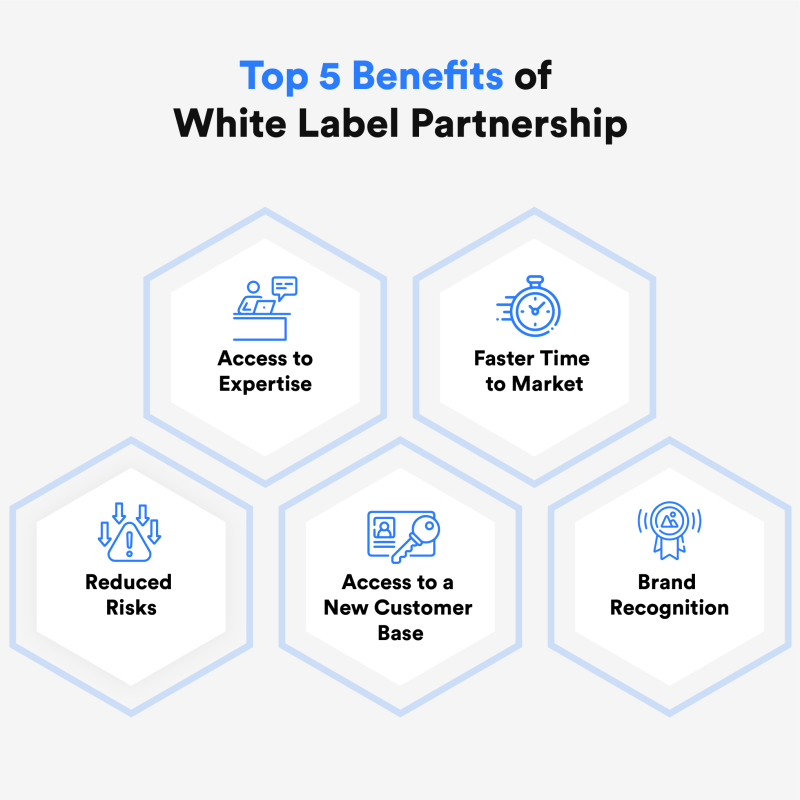
Here are the six crucial steps to building a successful white label partnership:
Grasping the Essence of White Label Partnerships
To embark on a successful white-label partnership journey, it’s crucial to grasp the essence of the concept. This collaborative arrangement involves one agency (the white-label partner) providing its services or products to another agency, which markets them under its brand.
This strategic alliance enables the white-label partner to expand its offerings without significant investments in additional resources. Meanwhile, the partner agency, which typically specializes in a distinct area like web design, digital marketing, or WordPress development, benefits by offering its clients comprehensive solutions without needing in-house development or specific expertise.
The key to this partnership lies in the synergy between the agencies. The white-label partner brings specialized expertise and solutions, while the partner agency leverages these offerings to broaden its service portfolio. This collaboration maximizes resources and focuses on delivering high-quality services or products.
Engaging in white-label agency services proves especially advantageous as it allows both parties to more effectively satisfy their client’s diverse needs. This approach not only facilitates business expansion and the generation of new revenue streams but also ensures the maintenance of a strong brand identity and customer loyalty, which are crucial in today’s competitive market.
Partner With Us For White-Label Agency Services
Leverage our expertise to help your client’s website rank higher and boost traffic.!
Evaluating and Selecting the Ideal White Label Partner
Once you’ve grasped the concept of white label partnerships, the next crucial step is to research and select the right partner. This choice is critical to your success, and there are several factors to consider:
Expertise and Experience
- Assess Skills and Knowledge: Ensure the potential partner has the expertise to deliver high-quality services or products that complement your agency’s offerings.
- Industry Understanding: A partner with a deep insight into your target market and current industry trends can contribute value to your mutual success.
Quality of Deliverables
- Review Samples and Case Studies: Request software samples, mockups, or case studies to evaluate their craftsmanship and attention to detail.
- Standards Assessment: This evaluation will help you understand their standards and ability to meet your agency’s and client’s expectations.
Client Satisfaction
- Feedback from Existing Clients: Seek testimonials or feedback from their current clients to gauge their professionalism, reliability, and responsiveness.
- Record of Satisfaction: A history of satisfied clients strongly indicates their potential to deliver exceptional results and customer service.
Alignment of Values and Goals
- Shared Vision and Ethics: Choose a partner whose values and goals align with your agency’s. This alignment is essential for a long-term, successful partnership.
- Commitment to Excellence and Transparency: Look for partners who value excellence, transparency, and collaboration.
Scalability and Flexibility
- Ability to Scale and Adapt: Ensure the partner can scale their operations and adapt to your agency’s growing and changing needs.
Read: Top 5 White-Label SEO Service Providers
Establishing Clear Expectations and Objectives
Establishing clear expectations and objectives is pivotal in forging a successful white-label partnership. This clarity lays the groundwork for a harmonious collaboration and ensures that both parties are aligned in their efforts and goals.
Defining Scope of Work and Outcomes
- Detailed Scope of Work: Clearly outline the services or products, including specific features, functionalities, or service levels.
- Desired Outcomes: Articulate the end goals and what success looks like for the partnership. This includes both qualitative and quantitative measures.
Setting Realistic Turnaround Times
- Realistic Timeframes: Establish realistic deadlines considering the complexity of tasks, resource availability, and client needs.
- Communication of Deadlines: Communicate these timeframes to avoid misunderstandings and ensure a smooth workflow.
Upholding Quality Standards
- Quality Benchmarks: Define the expected level of quality for all deliverables, including any specific criteria or industry standards.
- Consistency in Delivery: Ensuring consistent quality is crucial for maintaining the reputation and credibility of both partners.
Fostering Open Communication and Transparency
- Regular Communication Channels: Establish channels for regular communication to ensure both parties are consistently informed and aligned.
- Environment for Open Dialogue: Create an environment where concerns, needs, and feedback can be openly shared.
- Protocol for Addressing Issues: A clear protocol for resolving any issues or conflicts is vital for maintaining a healthy partnership.
Both agencies can build a robust foundation for their partnership by setting clear expectations and objectives. Effective communication, transparency, and a shared understanding of deliverables, timelines, and quality standards are critical to seamless collaboration and mutual success.
Grow Your Business With A White-Label WordPress Agency
Explore our comprehensive white-label WordPress services and discover how partnering with us can elevate your ROI and expand your service offerings!
Read: Ultimate White Label SEO Guide For Agencies
Building a Robust Communication Framework

Developing a solid communication framework is essential for the success of any white-label partnership. Effective communication is the backbone of collaboration, progress tracking, and issue resolution. Here are vital steps to establish a successful communication strategy:
Scheduling Regular Meetings
- Consistent Meeting Schedule: Set up a regular schedule for meetings, weekly or monthly. These meetings are vital for discussing project progress, addressing concerns, and aligning on future tasks.
- Benefits of Regular Meetings: Consistent communication fosters transparency and keeps both parties informed and engaged, ensuring smooth progress.
Promptly Addressing Concerns
- Open Discussion Environment: Encourage a culture of openly discussing concerns and questions.
- Timely Issue Resolution: Address any issues promptly to prevent them from escalating. Being receptive to feedback and collaborating on solutions is crucial for a healthy partnership.
Collaborative Brainstorming
- Encourage Collective Creativity: Involve your white-label partner in brainstorming sessions. This collaborative effort should focus on sharing insights, exchanging ideas, and exploring innovative approaches.
- Leveraging Collective Expertise: Such collaboration taps into the collective expertise of both teams, leading to enhanced outcomes and greater client satisfaction.
Emphasizing Open and Transparent Communication
- Culture of Transparency: Foster open and transparent communication across all levels of the partnership.
- Building Trust and Collaboration: A transparent approach builds trust, strengthens the partnership, and creates a collaborative environment conducive to shared success.
By implementing these strategies, both parties can ensure that communication remains clear, consistent, and productive, ultimately paving the way for a successful and enduring white-label partnership.
Learn: How To White-Label WordPress?
Ensuring Brand Consistency and Quality Control
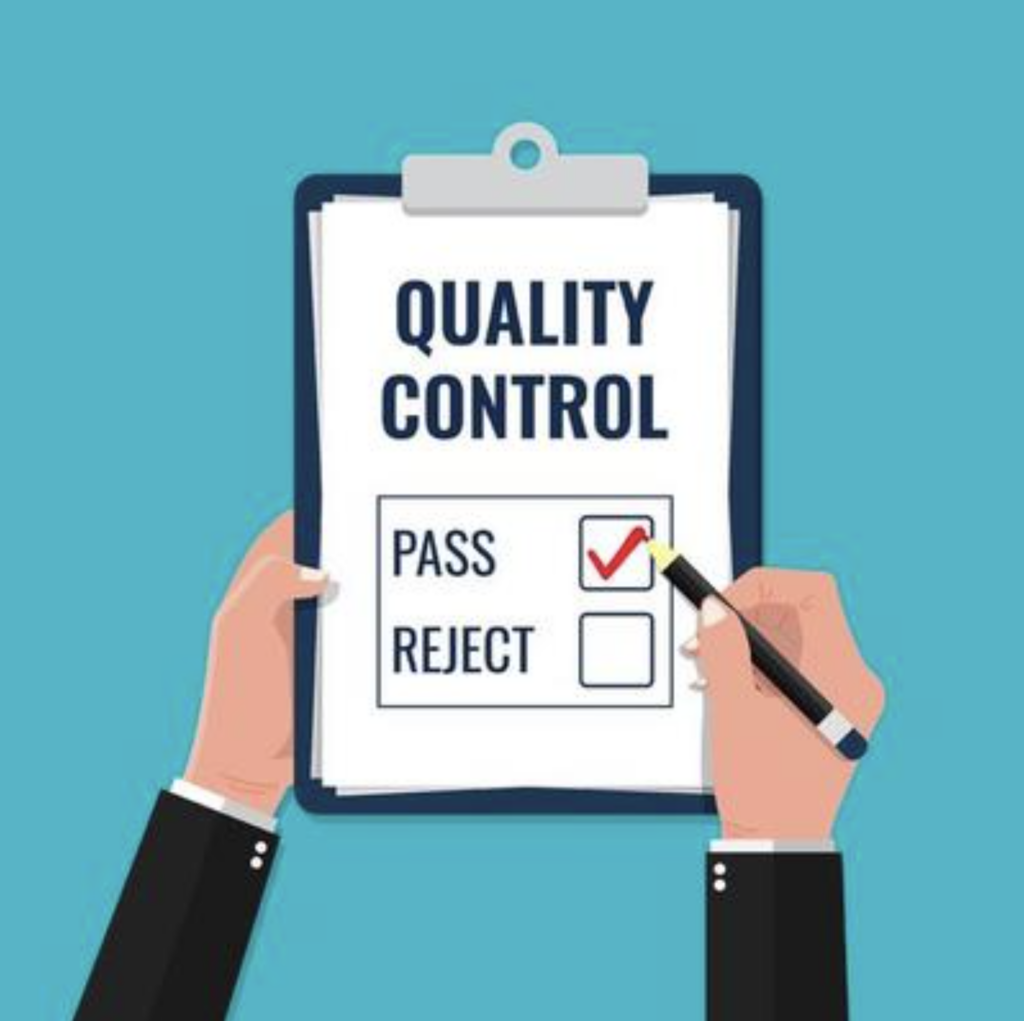
Maintaining brand consistency and stringent quality control is crucial in a white-label partnership. This adherence ensures the integrity of your brand image and guarantees that the services or products delivered meet your high standards. Here’s how to achieve this:
Upholding Brand Standards
- Brand Element Consistency: Ensure your partner agency maintains consistency in brand elements like logos, color palettes, typography, and tone of voice. This uniformity across all platforms, from websites to marketing materials, reinforces your brand identity and strengthens your market presence.
- Regular Brand Audits: Review your partner’s deliverables to ensure adherence to your brand standards.
Implementing Quality Control Measures
- Setting Quality Benchmarks: Implement quality control processes to evaluate the work against predefined standards and criteria.
- Comprehensive Review Process: This process should encompass functionality, design, content, and overall user experience. Regular quality checks help swiftly identify and rectify any inconsistencies or issues.
Collaborative Communication for Quality Assurance
- Feedback and Guidance: Maintain open and transparent communication with your white-label partner. Provide constructive feedback and guidance to help them align with your brand standards.
- Encourage Collaboration: Foster a collaborative atmosphere where both parties can work together to refine and enhance the quality of deliverables.
By prioritizing brand consistency and quality control, your agency can ensure that the partnership aligns with and elevates your brand’s reputation for excellence. This approach is critical to building a sustainable and successful white-label partnership.’
Read: Best Instagram Advertising Strategy For Your Brand
Continuous Evaluation and Performance Optimization

For a white-label partnership to thrive in the long term, continuous performance evaluation and optimization are essential. Regular assessments help identify improvement areas, ensuring the partnership aligns with your agency’s goals and meets client expectations. Here are vital steps to provide adequate performance evaluation:
Evaluating Deliverable Quality
- Ongoing Quality Assessments: Regularly assess the quality of deliverables from your white-label partner. Focus on accuracy, functionality, design, and adherence to deadlines.
- Alignment with Standards and Needs: Analyze if the deliverables meet your agency’s standards and client requirements. Address any issues promptly and provide constructive feedback to drive improvements.
Soliciting Client Feedback
- Active Feedback Collection: Regularly seek client feedback about their experiences with the white-label services or products.
- Insightful Client Input: Client feedback is invaluable for identifying strengths and areas needing refinement. Assess satisfaction levels, pinpoint pain points, and consider suggestions for enhancements.
Continuous Improvement
- Adaptation and Refinement: Use the insights gained from evaluations and client feedback to refine your partnership approach continuously.
- Proactive Improvement Measures: Make adjustments and improvements to ensure the partnership remains dynamic and responsive to changing needs.
By consistently evaluating and optimizing the performance of your white-label partnership, you can maintain alignment with your agency’s objectives, deliver exceptional value to clients, and foster a culture of continuous improvement. This commitment to excellence and adaptability is critical to strengthening the partnership and ensuring its success.
Read: Best White Label Website Builders
Popular Industries for White Label Partnerships
White label partnerships are prevalent in various industries where specialization and brand differentiation are key. Here are some of the most common sectors:
WordPress Services
WordPress services, including white label WordPress development, design, maintenance, and hosting, are significant areas for white label partnerships. Companies offering these services provide tailored solutions that other agencies can rebrand and present to their clients. This approach is particularly beneficial for agencies that want to offer comprehensive web development services without investing in a full-scale development team.
Software Development
The software development industry frequently utilizes white label partnerships to offer comprehensive solutions without extensive in-house development. This includes areas such as mobile app development, where specialized agencies provide ready-made applications that other companies rebrand and offer to their clients. Other areas include custom software solutions, SaaS products, and more.
Consumer Products
In the consumer products sector, white label arrangements are common for retail and private label goods. Supermarkets, for example, often sell private label products manufactured by third-party companies. These products are branded under the supermarket’s name, providing customers with more affordable options while maintaining the perceived quality associated with the store’s brand.
Digital Marketing Services
Digital marketing is another field where white label partnerships thrive. Agencies offering SEO, PPC, and social media marketing services often collaborate with specialized providers. These partnerships allow agencies to offer a broader range of services without developing the expertise in-house, ensuring they can meet diverse client needs efficiently.
Explore: Best White Label WordPress Management Services for Agencies
Examples of Successful White Label Partnerships
To illustrate the effectiveness of white label partnerships, consider the following examples:
WordPress Development: WordPress services, including white-label WordPress development, design, maintenance, and hosting, are significant areas for white label partnerships. Companies offering these services provide tailored solutions that other agencies can rebrand and present to their clients. This approach is particularly beneficial for agencies that want to offer comprehensive web development services without investing in a full-scale development team.
Example: Case Study – Chenchula
Chenchula, a Los Angeles-based company, required assistance managing over 30 client websites. Seahawk provided white label WordPress services, including web development, design, hacked site repair, and support. This partnership allowed Chenchula to focus on business operations while we at Seahawk handled the technical workload. The result was improved client satisfaction and business growth for Chenchula.
Click on the link to read the entire Chenchula case study!
Tech Companies: Many tech companies use white label solutions to enhance their software offerings. For instance, a company might use a white label CRM system that they rebrand and offer to their clients, thus adding value without the need for in-house development.
Financial Services: Banks and financial institutions often partner with fintech companies to offer innovative solutions under their own brand. This enables them to stay competitive and provide advanced digital services to their customers.
E-commerce Platforms: E-commerce businesses might use white label services for website development, payment processing, and logistics. By leveraging specialized providers, they can focus on core business activities like marketing and customer service.
By understanding the concept, benefits, and industry applications of white label partnerships, businesses can strategically leverage this model to enhance their offerings, enter new markets, and drive growth effectively.
Criteria for Being the Right White-Label Partner for Your Business
Picking a white-label partner for WordPress is a big decision. You want someone who’ll boost your business, not drag it down. Find out what really matters when making this choice.
WordPress Mastery

Your partner should know WordPress like the back of their hand.
They need to:
- Build Custom Themes and Plugins: Develop unique themes and plugins tailored to your specific needs.
- Handle Complex Updates: Efficiently manage and implement updates without disrupting your site.
- Fix Issues Fast: Quickly troubleshoot and resolve any problems that arise.
Brand Chameleon Skills
Find someone who can blend in seamlessly. They should:
- Adapt to Your Brand Voice: Understand and reflect your brand’s unique voice and tone.
- Create Designs that Match Your Style: Develop designs that are consistent with your brand’s aesthetic.
- Work Smoothly with Your Team: Collaborate effectively with your team members to ensure cohesion.
Read More: Best White Label Website Design Agencies: Top Picks
Rock-Solid Reliability
When the pressure’s on, you need a partner who delivers. Look for:
- Consistent On-Time Delivery: Always meet deadlines and deliver projects on schedule.
- Clear Communication: Maintain transparent and open communication throughout the project.
- Smart Backup Plans: Have contingency plans in place to handle unexpected challenges.
Read More: Best White-Label Speed Optimization Services for WordPress
Actually Helpful Support
Good support is a game-changer. Check if they offer:
- Quick Response Times: Provide prompt assistance whenever you need it.
- Easy-to-Use Documentation: Offer comprehensive and user-friendly documentation for your reference.
- Training for Your Team: Provide training sessions to help your team make the most of WordPress.
Smart Pricing
Make sure the numbers make sense. Their pricing should:
- Fit Your Budget: Be affordable and within your financial plan.
- Scale with Your Needs: Adjust based on your evolving requirements.
- Be Clear and Upfront: Offer transparent and straightforward pricing without hidden fees.
Also Check: WordPress Pricing: How Much Does A WordPress Website Cost?
Top 5 White-Label WordPress Partners to Consider
Here are the top 5 white-label WordPress partners you should consider for seamless and expert-level WordPress development.
Seahawk

Seahawk stands out as a premier white-label WordPress agency, empowering other agencies to expand their service offerings seamlessly. Specializing in a range of services, Seahawk enables you to deliver top-tier WordPress solutions to your clients effortlessly.
Key Service Aspects:
- Comprehensive Development: Expertise in WordPress development, custom website design, conversion and migration, WooCommerce development, and ongoing support.
- Agency Integration: Seamlessly incorporate our services into your agency’s offerings, providing comprehensive solutions without the need to manage technical details.
- Scalable Solutions: Tailored white-label services designed to meet the needs of small businesses, agencies, and large enterprises, ensuring flexibility and scalability.
- Dedicated Support: Enjoy 24/7 support and close, family-like assistance via Slack, ensuring your business runs smoothly around the clock.
WP Tasks
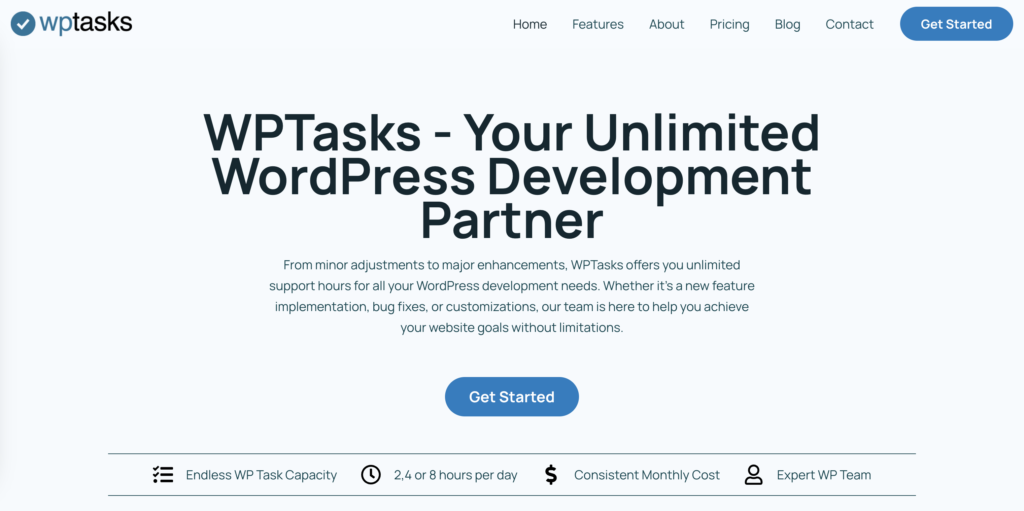
WP Tasks is your go-to partner for all things WordPress, offering comprehensive white-label development services. From minor tweaks to major overhauls, their team provides unlimited support hours, ensuring your website reaches its full potential.
Key Service Aspects:
- Unlimited Support Hours: Access continuous development support without worrying about hour limits.
- Feature Implementation: Seamlessly integrate new features to enhance your website’s functionality.
- Bug Fixes: Swiftly address and resolve any issues to ensure your site runs smoothly.
- Customizations: Tailor your website to meet specific needs and preferences, achieving a unique and professional look.
WPBeginner Pro Services
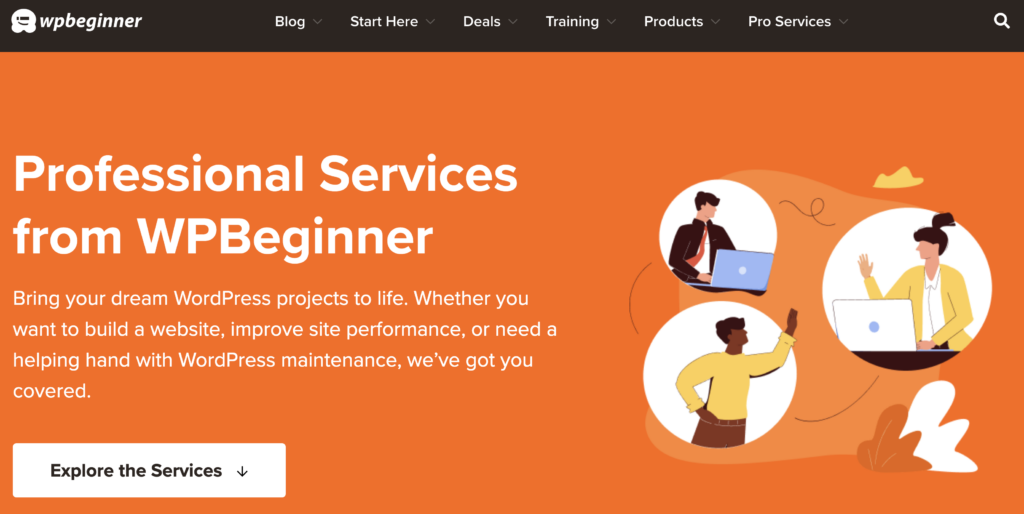
WPBeginner is a top-tier service provider for WordPress tasks, offering a comprehensive suite of services to help clients build, maintain, and optimize their websites. With a range of packages and a commitment to quality, it stands out as a reliable partner for all your WordPress needs.
Key Service Aspects:
- Website Design and Development: Create beautiful, professionally branded WordPress sites.
- Maintenance: Handle all technical aspects, including updates, backups, and security checks.
- SEO Services: Enhance search traffic, rankings, and revenue with expert optimization.
- Security: Fix hacked sites, remove malicious code, and implement proactive security measures.
- Speed Optimization: Improve site performance for faster load times and better user experience.
Keep Reading: Front-end Optimization (FEO) Guide
DreamHost Pro Services
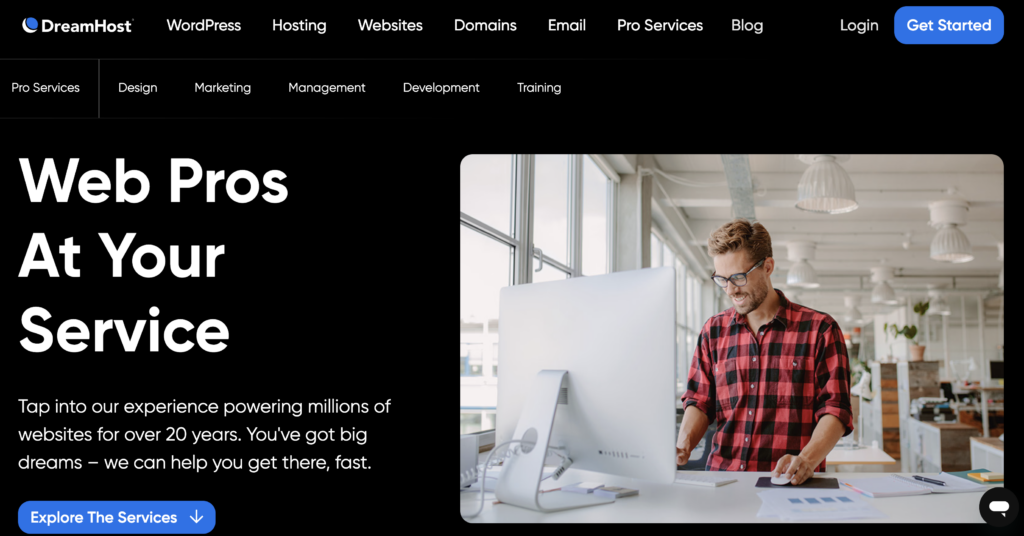
DreamHost is a trusted service provider offering unlimited WordPress development tasks. With over 20 years of experience powering millions of websites, DreamHost delivers professional, comprehensive services to help you achieve your online goals.
Key Service Aspects:
- Web Design & Branding: Craft professional logos, corporate branding, and unique custom websites.
- Site Management: Offload backend tasks to focus more on your core business activities.
- Web Development: On-demand or monthly retainer services for any development needs.
- Web Marketing: SEO, social media management, and other marketing services to increase your site’s visibility.
- Training: One-on-one sessions with experts to answer your questions and provide personalized instruction.
Read More: Best WordPress SEO Agencies To Boost Your Website Rankings
Nexcess Pro Services
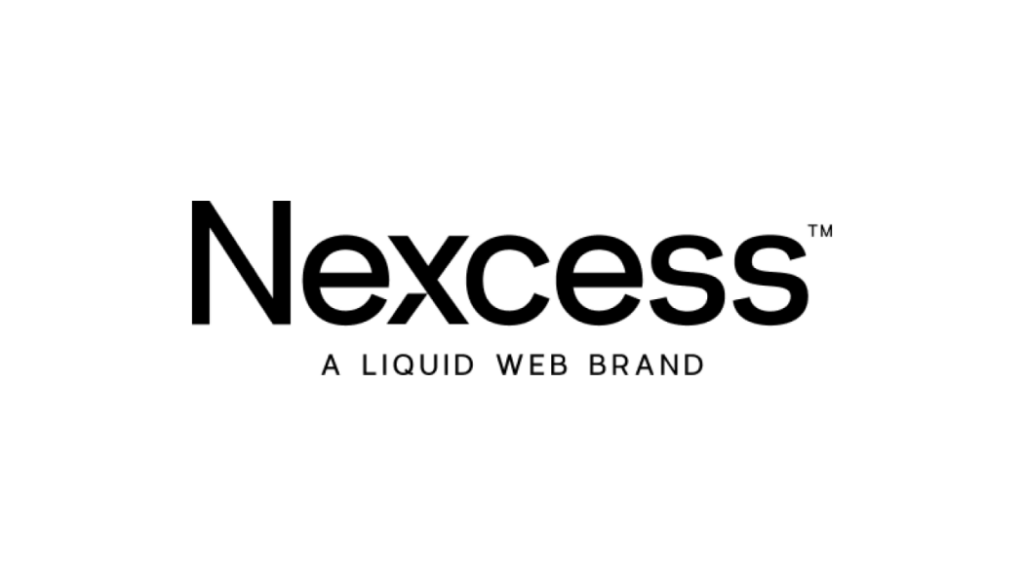
Nexcess offers a comprehensive suite of WordPress development services designed to support and enhance your website’s performance. Known for their robust hosting solutions, they also provide expert development services.
Key Service Aspects:
- Managed WordPress Hosting: Secure and scalable hosting solutions tailored for WordPress.
- Custom Development: Tailored WordPress development services to meet unique business needs.
- Performance Optimization: Advanced techniques to enhance site speed and performance.
- Security Services: Proactive measures to protect your site from threats and vulnerabilities.
Read More: Outsource WordPress Website Design: Ultimate Guide
Wrap-Up: Building a Successful White Label Partnership
In conclusion, establishing and nurturing a successful white label partnership requires a strategic and comprehensive approach. Here’s a summary of the key steps to guide you through this process:
- Grasp the White Label Partnership Concept: Understand the collaborative nature of this partnership, where one agency offers its services or products to another to sell under its brand.
- Research & Select the Right Partner: Carefully choose a partner whose expertise, experience, and values align with your agency’s goals.
- Set Clear Expectations and Objectives: Define the scope of work, desired outcomes, and key deliverables to align efforts and work towards shared success.
- Develop a Strong Communication Framework: Establish regular meetings, encourage open dialogue, and foster a culture of collaborative brainstorming and transparency.
- Maintain Brand Consistency & Quality Control: Uphold high standards in quality and ensure brand consistency in all aspects of the partnership’s output.
- Continuously Evaluate and Optimize Performance: Regularly assess the quality of deliverables and client feedback to identify areas for improvement and refine your strategies accordingly.
Remember, a successful white label partnership is built on mutual understanding, aligned goals, continuous communication, and a commitment to quality and brand integrity. By following these steps and maintaining a proactive approach to collaboration and improvement, your agency can maximize the benefits of this partnership, leading to expanded offerings, enhanced client satisfaction, and overall business growth.
FAQS – White Label Partnership
What is a white label partnership?
A white label partnership is when two companies work together to create a product or service. One company, the “service provider,” creates the product, and the other, the “reseller,” rebrands it to sell to customers. The reseller can customize the product with their branding, making it look like it’s their own. This way, they can expand their product offerings without having to design and build everything from scratch.
What should be included in a white label partnership agreement?
A white label partnership agreement should include details on responsibilities, intellectual property rights, confidentiality agreements, quality standards, and protocols for communication and issue resolution. Clear contracts protect both parties’ interests and outline the terms of the partnership.
How do you maintain quality in a white label partnership?
Maintaining quality in a white label partnership involves setting clear quality benchmarks, conducting regular quality assessments, and ensuring consistent communication. Both partners should agree on quality standards and work together to meet them consistently.
Which industries commonly use white label partnerships?
White label partnerships are common in industries such as software development, consumer products, digital marketing services, and WordPress development. These industries benefit from specialized expertise and the ability to offer a broader range of services.
Can white label partnerships help in scaling a business?
Yes, white label partnerships can significantly help in scaling a business. They allow companies to expand their offerings and reach new markets without the need for extensive internal resources, enabling faster growth and improved operational efficiency.
What are the benefits of white label partnerships?
White label partnerships are great because they can help businesses grow without high costs. By partnering with a white label service provider, a company can offer new products or services, save on development expenses, and get advice from experts. It’s also a way to reach a larger audience and reduce risk because the service provider has already done much of the work.
What to look for in a white label partnership?
When choosing a white label partner, look for companies that align with your business goals and share similar values. Experience in your industry is also important, along with clear contract terms that protect your interests. A good partner should have a solid track record and allow you to test their product or service before committing fully.
How to ensure a successful white label partnership?
Clear communication is key to ensuring a successful partnership. Make sure you define each party’s roles and responsibilities in a written contract. It’s also important to discuss the level of support you’ll receive and ensure there’s a service-level agreement (SLA) in place. With these elements, you’ll be on track to building a strong, successful partnership with your white-label service provider.








